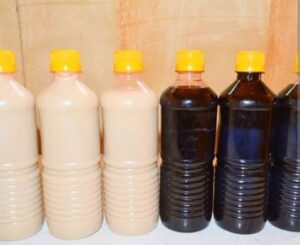

By Dada Ahmed in Lokoja.

Photo credit: Facebook.
Many Kunu and zobo sellers in Lokoja, Kogi State, north-central Nigeria, are experiencing a significant drop in sales due to the recent cholera outbreak in the country.
Our correspondent recalls that health experts in Nigeria have warned members of the public to desist from consuming some local drinks such as kunu and zobo in the wake of cholera out break of cholera in 31 out of 36 states of the federation and the FCT.
These traders report that consumers are avoiding local drinks out of fear of contamination.
In separate interviews with our correspondent on Tuesday, several sellers noted that their sales had decreased considerably since the cholera outbreak began.
People don’t patronize much these days. They say they are scared to buy our drinks because they don’t want to take any risks with their health,”said Amina Mohammed, a seller of drink said.
Health experts explain that cholera is caused by the bacterium Vibrio cholerae, adding that this bacterium is typically found in water or food sources contaminated with feces from an infected person.
According to them,aeas with inadequate sanitation and poor hygiene practices are particularly susceptible to cholera outbreaks.
The experts identify the lack of proper sewage treatment and clean water supply as key factors in the spread of cholera.
The experts, who said that improper disposal of human waste can contaminate water sources, leading to the spread of the disease, explained that cholera is primarily transmitted through contaminated water or food, rather than direct human-to-human contact.
Cholera symptoms, they further explain range from mild to severe and include rapid onset of watery diarrhea, vomiting, and leg cramps.
Severe cases can lead to severe dehydration and shock, which can be fatal if untreated, pointing out that the incubation period for cholera is typically between 2 hours and 5 days, after ingestion of contaminated food or water.
On treatment, the experts urge patients to use oral rehydration to replace lost fluids and electrolytes.
In severe cases, they also urge that intravenous fluids and antibiotics may be required to reduce the severity and duration of symptoms.
On prevention,they advise the people to ensure access to clean water, proper sanitation, and good hygiene practices and recommend the use of cholera vaccines in high-risk areas
Meanwhile,the Nigeria Centre for Disease Control and Prevention (NCDC) has alerted the public to the increasing trend of cholera cases across the country as the rainy season intensifies.
It disclosed in a statement that from January 1 to June 11, 2024, 1,141 suspected and 65 confirmed cases of cholera, with 30 deaths, were reported across 96 LGAs in 30 states in Nigeria.
The NCDC identified Bayelsa, Zamfara, Abia, Cross River, Bauchi, Delta, Katsina, Imo, Nasarawa, and Lagos as the ten states contributing 90% of the cholera burden.
According to the centre,a multi-sectoral National Cholera Technical Working Group has been set up..
The statement indicates that the group, led by NCDC and include the Federal Ministries of Environment and Water Resources, the National Primary Health Care Development Agency (NPHCDA), the World Health Organization (WHO), UNICEF, and other partners, adding that the group had been providing support to the affected states.
“This support includes risk communication, active case search, laboratory diagnosis, case management, provision of response commodities, water sanitation and hygiene (WASH) interventions, and dissemination of cholera awareness jingles in both English and local languages,” it added.
With additional information by an AI language model developed by OpenAI.


